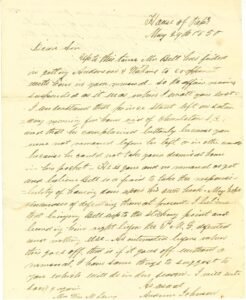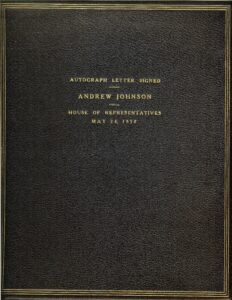
1850
“THE SLAVERY QUESTION ABSORBS EVERYTHING STILL”
JOHNSON, ANDREW. (1808-75). Seventeenth President of the United States (1865-9). Good and rather scarce, Autograph Letter Signed, “Andrew Johnson” written during the period of extreme political debate in the United States. 1 1/2 pages, quarto. “House of Rep[resentative]s”, May 24, 1850. Housed in a vintage custom dark-blue leather slip case. Old minor repairs, else fine condition. To “Mr. Wm. M. Lavry[?]”. Johnson writes:
“Dear Sir, Up to this time Mr. [Senator John] Bell has failed in getting Anderson and [Albert G.] Watkins to co-opponent [?] with him in your removal — so the affair remains suspended as it was when I wrote you last. I understand that prince Strut left on Saturday morning for home via of Charleston, S.C., and that he complained bitterly because you were not removed before he left or in other words because he could not take your dismissal home in his pocket. He is gone and no removal as yet and believe [Tennessee Senator John] Bell is a friend to take the responsibility of having done upon his own hook. My hope increases of defeating them at present. I believe that bringing Bell up to the sticking point and bending him might lessen the P.M.G. [Post Master General] defeated and nothing else. As estimated before when this goes off, that is if it goes off without a removal, I have some things to suggest to you which will do in due season. I will write soon again. As usual, Andrew Johnson.
[P.S.] I wish you would write and give me all the news of the town. Is any of my family sick. I fear some of them are sick and they will not write to me till they are well or dangerous. IF any of them are, I desire you to write to me plainly about it. The slavery question absorbs everything still.”
1850 was a turbulent time in the United States. Henry Clay had introduced a series of resolutions on January 29, 1850, in an attempt to seek a compromise and avert a crisis between the states. As part of the Compromise of 1850, the Fugitive Slave Act was amended and the slave trade in Washington, D.C., was abolished. Furthermore, California entered the Union as a free state and a territorial government was created in Utah. An act was also passed settling a boundary dispute between Texas and New Mexico, while also establishing a territorial government in New Mexico. Johnson’s reference to the on going slavery debates are especially choice, especially considering it was during his administration that the implementation of many of the facets of these agreements had to be carried out.
We encourage any prospective purchaser to further research Johnson’s career and thereby gain a fuller understanding of this somewhat underappreciated President. Just a choice autograph letter, ex John Stuart Groves sale at Parke-Bernet, New York, 1943.
$12,500.00

